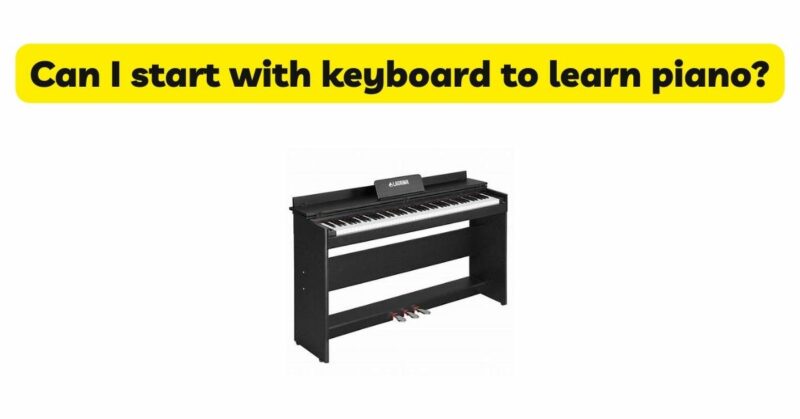The piano is a timeless and captivating instrument that many aspire to learn. For those considering their entry into the world of piano playing, the question often arises: Can I start with a keyboard to learn piano? In this article, we will explore the advantages, considerations, and potential benefits of using a keyboard as a starting point for learning piano. By examining the unique characteristics, learning opportunities, and practical aspects, we aim to provide insights that will empower beginners to embark on their piano learning journey with a keyboard.
- Accessibility and Affordability: Using a keyboard as a starting point for learning piano offers distinct advantages in terms of accessibility and affordability. Keyboards are compact, lightweight, and portable, making them easily accessible for beginners who may have limited space or need to transport their instrument. Additionally, keyboards are generally more affordable than acoustic pianos, allowing aspiring pianists to begin their musical journey without a significant financial investment. This accessibility and affordability make keyboards an attractive option for beginners who are exploring their interest in piano playing or have budget constraints.
- Learning Fundamentals and Technique Development: Learning piano fundamentals and developing proper technique are essential aspects of a beginner’s journey. While keyboards may not replicate the exact touch and feel of an acoustic piano, they can still provide a suitable platform for learning the basics. Many keyboards today come equipped with weighted keys or graded hammer action, which mimic the touch sensitivity of acoustic pianos. These features enable beginners to develop finger strength, control, and the ability to play with expression. With consistent practice and attention to technique, learners can lay a strong foundation for their future piano playing.
- Sound Reproduction and Versatility: Acoustic pianos are renowned for their rich and resonant sound, but keyboards have made significant advancements in sound reproduction. High-quality keyboards utilize sound sampling technology to replicate the authentic sound of an acoustic piano. While the sound may not fully capture the nuances of an acoustic piano, modern keyboards offer impressive piano sounds that can satisfy beginners at various skill levels. Additionally, keyboards provide versatility with a wide range of instrument sounds, allowing learners to explore different genres and styles beyond traditional piano repertoire. This versatility can foster creativity and musical exploration.
- Learning Resources and Interactive Features: Keyboards offer an array of learning resources and interactive features that can enhance the learning experience for beginners. Many keyboards come with built-in tutorials, learning modes, and interactive lessons designed specifically for novice pianists. These features provide step-by-step guidance, finger placement assistance, and real-time feedback, helping beginners progress at their own pace. Some keyboards even have connectivity options to computers, tablets, or mobile devices, opening up a world of online tutorials, sheet music libraries, and interactive learning platforms. These resources can be invaluable tools for beginners to engage with and expand their musical knowledge.
- Transitioning to Acoustic Pianos: One concern often raised by beginners learning on a keyboard is the ability to transition smoothly to playing on an acoustic piano. While keyboards offer a different touch and feel compared to acoustic pianos, the core skills developed on a keyboard can be transferred to an acoustic piano with some adjustment. Once learners have established a solid foundation in technique, musicality, and note reading on a keyboard, they can apply those skills to an acoustic piano. Seeking guidance from an experienced teacher and periodically practicing on an acoustic piano can help ensure a successful transition and facilitate adaptation to the acoustic instrument’s nuances.
- Personal Preferences and Learning Style: When deciding to start with a keyboard to learn piano, it is crucial to consider personal preferences and learning style. Some individuals may be drawn to the convenience, portability, and versatility offered by keyboards. They may enjoy the ability to explore various sounds, experiment with different musical genres, and have the flexibility to practice wherever and whenever they choose. Others may have a strong desire to learn traditional piano repertoire and value the authenticity and touch of an acoustic piano. Reflecting on your musical inclinations, goals, and learning style can help guide your decision and ensure an enjoyable and fulfilling learning experience.
Conclusion: Starting with a keyboard to learn piano offers several advantages for beginners, including accessibility, affordability, learning resources, and sound versatility. While keyboards may not fully replicate the touch, feel, and sound of an acoustic piano, they provide a suitable platform for developing fundamental skills and technique. As beginners progress and develop their musical abilities, they can adapt their skills to an acoustic piano with guidance and practice. Ultimately, the decision to start with a keyboard or an acoustic piano depends on personal circumstances, goals, and preferences. Regardless of the instrument chosen, consistent practice, dedication, and a love for music are key to unlocking the joy and fulfillment of piano playing.


